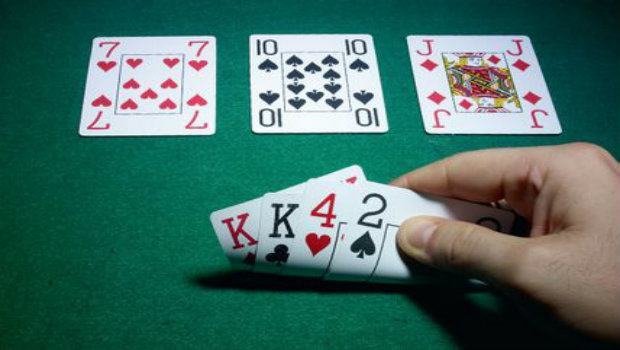
Types of Poker Actions
First, let’s cover the various types of actions found at the poker table.
- Bet – to place an initial wager.
- Call – to match an opponent's wager.
- Check – opting not to place a wager, and passing the action to the next player or street.
- Fold – forfeiting your hand facing a wager.
- Raise – to increase the size of an opponent's wager.
- All-in - All-in - a variant of the bet, call, or raise, involving a player wagering all of their remaining chips.
Below, we’ve outlined the two titans of modern-day poker, namely No-Limit Texas Hold’em and Pot-Limit Omaha.
No-Limit Texas Hold’em
Texas Hold’em is the most popular variant of poker, and has been described as the “Cadillac of Poker” by long-time ambassador of the game, Doyle Brunson. The game’s No-Limit form has come to dominate the scene, over the likes of its counterpart – Limit Hold’em, which has lost popularity in recent years.
Texas Hold’em rules:
- The player to the left of the dealer is the small blind, followed by the big blind. These players must post the blinds.
- Each player is dealt two hole cards face down and the first round of betting begins. The player to the left of the big blind is first to act, and the big blind is last to act. Each player can look at their cards and call, raise, or fold.
- Three community cards are dealt face-up in the middle of the table. This is known as the flop, which is followed by a second round of betting. On the flop, and subsequent betting rounds, the small blind is first to act, and the dealer is last to act.
- A fourth community card is dealt (the turn) where the third round of betting commences, followed by a fifth community card (the river) and a fourth and final round of betting.
- After the final round of betting, players that are still in must reveal their hands; this is known as showdown. Whoever shows down the best five-card hand using any five of the seven available cards (two hole cards and five community cards), wins.
Pros
- Relatively easy to learn.
- Widely available.
Cons
- The level of play tends to be high, given its popularity.
Pot-Limit Omaha
Pot-Limit Omaha (PLO) is another favorite, having picked up traction in recent years with its action-packed reputation.
PLO rules:
- The blinds, community cards, and betting rounds are all the same as in Hold’em.
- However, players are dealt four hole cards instead of two and must use two of them along with three community cards to make the best five-card hand. Players can also only bet or raise up to the size of the pot, thus the name!
Pros
- Action-packed.
- A fun alternative to Texas Hold’em.
Cons
- Calculating how much you can bet or raise on the fly can be difficult.
Other popular poker variants include:
- Omaha Hi-Lo - the defining feature of Hi-Lo poker is that the pot is split evenly between the best high and low hand (using the hand ranking system in reverse, which is known as lowball). Omaha Hi-Lo plays essentially the same as PLO, just at showdown the pot is divided between these hands. Note, winning both the best high and hand in Omaha Hi-Lo is commonly known as “scooping”.
- Seven-Card Stud - before the Texas Hold’em came to the forefront of poker’s popularity, Stud poker was the most widespread form of poker. In Seven-Card Stud, there are no community cards and it’s almost always played with fixed betting limits. Each player in Stud receives their own individual hand; some of these cards will be face down and hidden from the table, while others will be face up and exposed to the table. There are seven rounds of betting, otherwise known as “streets” before showdown is reached. While Seven-Card Stud is relatively easy to learn, it can be difficult to keep track of everyone’s hands.
- 2-7 Triple Draw - another popular lowball game, in which the goal is to make the best possible low hand. Betting commences over four rounds once each player has been dealt 5 hole cards, with players getting the opportunity to draw (discard and replace cards) three times. In 2-7 Triple Draw, aces are high and straights/flushes do count against making a low hand.
- Razz - A lowball version of Stud Poker. Gameplay works similarly to Seven-Card Stud, although the lowest hand wins. Aces are low, and straights/flushes do not count against making a low hand (making A2345 the lowest/best possible hand).
- Other poker variants include Short Deck (6+ Hold’em), 5 Card Draw, 5 Card Draw Omaha, Badugi, HORSE, Chinese Poker, and more!
Encountering rake – as the cost of playing – is an unfortunate inevitability, regardless of your game of choice. By signing up with an affiliate, you may be able to offset this cost through additional rakeback. Taking advantage of affiliate deals like the ones available at rakerace.com is thus highly recommended!
Hopefully this article has provided some insight into the game of poker and its many forms. While No-Limit Hold’em and Pot-Limit Omaha are the most popular and widespread games, don’t forget that there are so many other fun variants to choose from!















0 comments